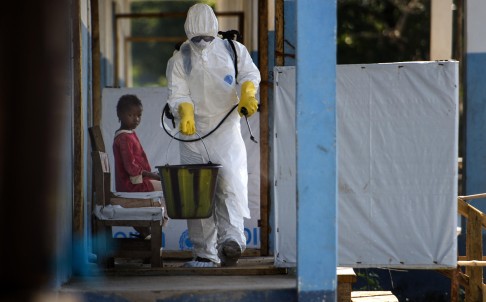Trust is the first cure in beating Ebola as families still hiding suspected victims
Foday Kalma's family is just one of many in Sierra Leone who hide from treatment out of fear in a country where the virus is winning
PUBLISHED : Thursday, 04 December, 2014, 11:05pm
UPDATED : Friday, 05 December, 2014, 1:14am
Washington Post in Koinadugu, Sierra Leone

Fatmata Kalma, 9, watches an Ebola worker. Photo: Washington Post
His daughter had just been coaxed into an ambulance bound for the Ebola centre. As Foday Kalma watched, his neighbours and relatives crowded around, wailing that she was being driven to her death.
Kalma, 43, couldn't bear it. He had already lost his wife and mother-in-law to the disease. Suddenly, nine-year-old Fatmata jumped out of the ambulance and ran to her two siblings. That's when Kalma made a split-second decision that would rattle the region's medical establishment: He and his kids bolted for the jungle.
Another family of possible Ebola carriers was on the run.
Six months after the world's largest Ebola outbreak began, experts say one of their biggest challenges is convincing people to trust the medical system. Families still hide suspected victims or refuse to take them to health facilities. The problem exists in Liberia, but some foreign health officials say it's even more daunting in Sierra Leone, where the transmission rate continues to climb even as it declines in the neighbouring country.
The influx of foreign health workers in moonsuits has terrified residents. One villager demanded that his daughter "be taken away from the white people". Another man with Ebola symptoms climbed a tree to escape a team that wanted to bring him in for treatment. "He's going to starve out there," said John Koroma, one of the "contact tracers" trying to bring him in.
Every day, teams of officials plunged into the jungle, searching for people exposed to Ebola who had fled medical treatment. Officially, 1,583 people have died from the disease in Sierra Leone since May. But authorities suspect entire families have perished in the wilderness, before Ebola tests were even taken. Kalma and his children could be next, officials feared. "We need to get that family back," said Konjo Marah, a contract tracer.
When a sudden outbreak of Ebola in October killed dozens of people, a Koinadugu schoolhouse was converted into an isolation centre, where suspected patients could be monitored until tests came back. Health workers understand why many families viewed their whole operation with scepticism.
"Their kids are taken away and they don't have any information," said Gisa Kohler, the World Health Organisation's team leader in Koinadugu. "Of course they're not going to trust us."
Kalma's family made it to a tiny hut in the jungle, near a small swath of land he sometimes tended. He told Fatmata, who had a fever and diarrhoea, to lie in one corner. He kept his son, 8, and other daughter, 5, who appeared to have no symptoms, on the other side of the room.
The loss of his children was the worst thing he could imagine. He was so frightened of losing his daughter that he could barely think, he later said.
"I would do anything to stay together," Kalma would say.
A day after Kalma and his children disappeared, a team of contact tracers went to speak to his neighbours, who mentioned his small jungle plot.
A group of men traipsed through the brush towards the hut. This time, they brought three Ebola survivors who would help them reinforce their message: If you get your daughter early treatment, she can survive.
When they finally found Kalma, the survivors, the ambulance driver and the contact tracers took turns lecturing him.
The rules forbade families from staying at the isolation centre with their relatives if they didn't have symptoms. But the health workers promised Kalma that his entire family could come to the centre if he brought his daughter.
Finally, Kalma consented.
"The place for humans is in the village, not in the bush," he later said, recounting his decision. "I couldn't stay out there."
Still, the health workers worried about what will happen if Fatmata dies. "Right now this looks like a step forward," Sebastian Soulier, a World Health Organisation specialist said. "But if the girl dies, it's 10 steps back."
